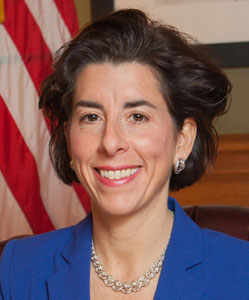It is no surprise to see that President Biden selected Gina Raimondo, the governor of Rhode Island, to be in his cabinet, specifically, as his U.S. Commerce Secretary. Raimondo is the latest in a long line of strong Italian American women in politics – a link which is no less legit simply because our myopic media fails to adequately recognize it.

Gov. Gina Raimondo
It’s a familiar topic to Italian Americans who know their history, but not to the general public, to wit: In our 243 years as a nation, it was Italian American women who eventually shattered the “glass ceiling” of male-dominated American politics. There were, indeed, previous trail-blazers, such as Victoria Woodhall, who ran for president in 1872, and Congresswoman Shirly Chisholm (D-NY), who did the same in 1972.
But it was Ella Grasso who was elected the first female governor in her own right, without being appointed by anyone or succeeding a husband (1974). It was Geraldine Ferraro who was nominated at the first female VP candidate for a major political party (1984). It was Nancy Pelosi who became the first female Speaker of the House (2006).
We now have our first actual female vice president, Kamala Harris. Yet, it’s undeniable that the Grasso/Ferraro/Pelosi “triumvirate” paved the way for such an achievement.
First elected governor in 2014, Raimondo previously made a name for herself as the state’s treasurer and, before that, as the founder of one of the state’s first venture capital firms. She was an early trail-blazer herself, one of the first girls allowed to attend LaSalle Academy, an all-boys’ Catholic prep school. She quickly unlocked any shackles of tokenism by proceeding to become the school’s valedictorian.
Her early educational success set the template for what followed: She earned a BA at Harvard, a doctorate in Philosophy at Oxford University in England as a Rhodes scholar, and a Juris Doctor at Yale. After clerking for federal judge Kimbra Wood, Raimondo returned to her home-state, beginning the career ascent now culminating in a Biden cabinet position.
Interestingly, before the George Floyd killing inspired Biden to commit to choosing a Black female VP, Raimondo was on his short list of potential running mates. In a May 22nd article in the Washington Post, conservative columnist George Will, of all people, sang Raimondo’s praises, saying a Biden/Raimondo ticket would restore “adult supervision” to the White House. A few days later came the Floyd incident. But, clearly, Raimondo was still on Biden’s radar.
Raimondo made national headlines last summer via a scuffle with fellow Italian American governor Andrew Cuomo from New York, demanding that people from his COVID-infected state who visit Rhode Island quarantine for two weeks. She later expanded her directive to include people from other states.
Her positive handling of the pandemic, however, led to a surge in her popularity, as did her election as chair of the Democratic Governors Association in 2019. So did previous initiatives such as cutting taxes and regulations, implementing paid sick leave, and raising the minimum wage to $11.50, higher than the national average.
Her father, Joseph, lost his job at the Bulova Watch factory when he was 56 years old, a victim of globalization. Memories of that event, watching her father and others struggle to get back on their feet, no doubt inspired Gov. Raimondo’s common-sense concerns.
Raimondo is not without her critics. An initiative to computerize state records didn’t go very smoothly. The state’s department of child services was called by an Obama official “one of the most messed-up agencies ever.” Her goal of managing state pension systems was considered wobbly, at best. But, Raimondo’s intellect and physical energy (she regularly jogs, and played rugby in college) seem to easily surmount any negatives.
Thanks to the economic devastation caused by the Coronavirus, Raimondo’s cabinet position will become even more visible and important. And, if she does a fine job, perhaps a “President Raimondo” may not be too strange of a concept to ponder.
(Final note: An Italian woman, Elena Cornaro, was also the first woman in the world –repeat: the world – to receive a university degree, earned at the University of Padua in 1678. The topic of what Italic women have achieved throughout the centuries, in all categories, is compiled in a three-part series of articles in Italic Way Magazine called “Lady Power,” all of which can be found in the Research Library of our website. (Read and be amazed!). –BDC

Great article Bill! Let us hope that Raimondo’s appointment is the first of many in this new administration for Italian Americans.
And a great ending with reference to Elena Lucrezia Cornaro, for she did break records even way back in history. One wonders outside of our Italian American ben informati if students learn of her in school. I do know that Vassar College has always known of her with their famed window in their library or chapel. And yes, The NYSOSDIA has an annual award that was started back in 1977-78 during the then administration of Peter R. Zuzolo as state President following appropriate research by yours truly.
Kind words. Thank you.
Yes, in addition to Vassar College, there is also a mural of Cornaro in the “Italian Room” at the University of Pittsburgh’s famous “Nationality Hall,” a series of classrooms dedicated to the nations of the world. Seat benches in the room also highlight the various universities founded in Italy, going all the way back to the University of Bologna in 1088.
And on June 5th, 2019, on the 373rd anniversary of her birth, Cornaro was featured as a “Google Doodle,” a visual image of her reading a book which popped up on that day whenever anyone accessed Google’s services. But: Cornaro is more than just a doodle!